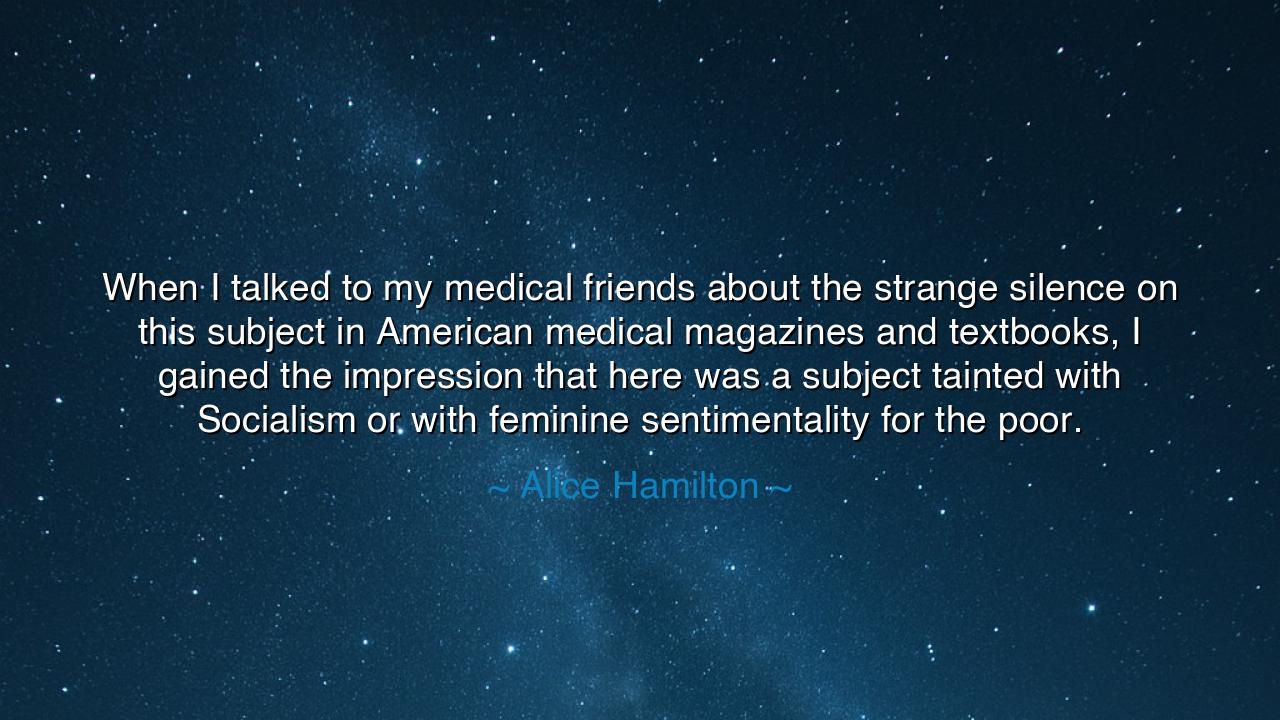
When I talked to my medical friends about the strange silence on
When I talked to my medical friends about the strange silence on this subject in American medical magazines and textbooks, I gained the impression that here was a subject tainted with Socialism or with feminine sentimentality for the poor.






The words of Alice Hamilton—“When I talked to my medical friends about the strange silence on this subject in American medical magazines and textbooks, I gained the impression that here was a subject tainted with Socialism or with feminine sentimentality for the poor.”—are heavy with both sorrow and defiance. They unveil not just a silence, but a deliberate turning away, a refusal by the medical establishment to confront suffering because it was considered politically inconvenient or emotionally unbecoming of “serious” science. Her words cut through the complacency of her time and reveal a deeper truth: that to speak of the poor, to defend them, to study the diseases of the laborer, was often dismissed as weakness or ideology rather than recognized as the true duty of medicine.
At the heart of her statement is the struggle between justice and pride. Hamilton, who pioneered occupational health, saw firsthand the illnesses of workers poisoned by lead, phosphorus, and industrial toxins. Yet when she turned to her colleagues for support, she found indifference. The suffering of laborers, it seemed, was not considered a noble subject, but one associated with Socialism or dismissed as sentimentality—as though compassion itself weakened the rigor of science. Here lies the tragedy: that medicine, which should serve all, was too often chained to the prejudices of wealth and class.
The ancients also knew of this battle. In Rome, Galen treated emperors and gladiators alike, but his writings often emphasized the nobility of tending the powerful, while the ailments of the poor remained less chronicled. Yet in contrast, the Hippocratic oath declared the physician’s duty to every patient, regardless of rank. Hamilton’s lament echoes this ancient conflict: will medicine serve all humanity, or only the privileged who can pay and who are deemed worthy of scientific attention?
History gives us another example in the life of Florence Nightingale. When she sought to reform hospitals and reduce the suffering of common soldiers, many dismissed her as meddling or sentimental, a woman too emotional for the hard world of medicine. Yet her statistics, her rigor, and her compassion together transformed public health. Like Hamilton, she bore the burden of being accused of feminine sentimentality, when in truth her concern for the forgotten was not weakness but strength, born of courage to see what others ignored.
The emotional force of Hamilton’s words lies in the phrase “strange silence.” For silence in science is rarely accidental—it is chosen. To ignore a subject is to declare, without speaking, that it is unworthy of study. Yet silence does not erase suffering; it merely condemns it to continue unchallenged. Hamilton’s recognition of this silence was the spark that made her fight, that made her challenge her colleagues, and that made her a pioneer. Her defiance turned silence into voice, and neglect into advocacy.
The lesson for us is profound: do not let prejudice dictate compassion. Just because an issue is labeled “political” or “sentimental” does not make it unworthy of study or care. The true calling of medicine, and indeed of all knowledge, is to confront suffering wherever it exists, whether among the powerful or the powerless. Practically, this means lifting up neglected voices, studying forgotten diseases, and refusing to allow politics or pride to silence truth.
Thus, Alice Hamilton’s words endure as a command to future generations: where there is silence, speak; where there is neglect, act; where compassion is dismissed as weakness, prove it to be the greatest strength. For the true measure of science and of medicine is not how well it serves the comfortable, but how bravely it defends the forgotten. Let every healer, every thinker, and every leader remember: to turn away from the poor is to betray the very heart of wisdom.






AAdministratorAdministrator
Welcome, honored guests. Please leave a comment, we will respond soon